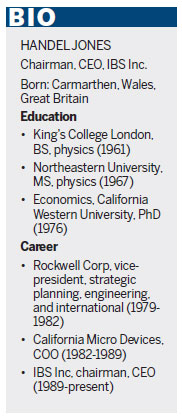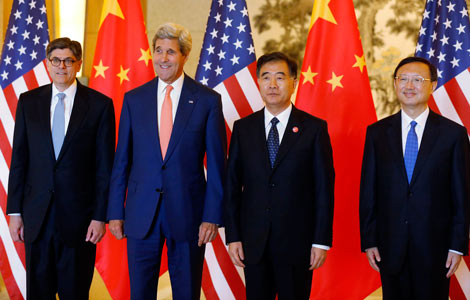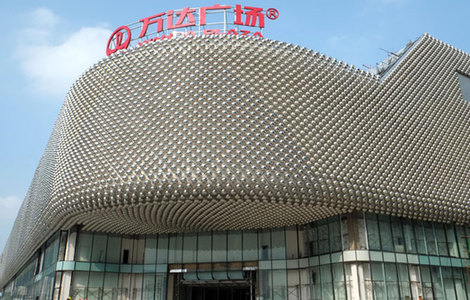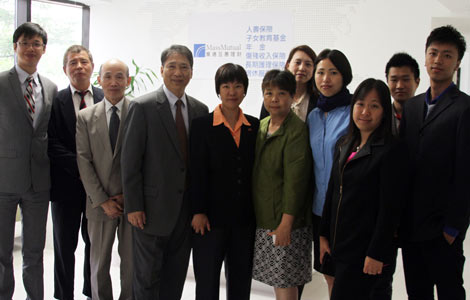Jones: China's 'must-do' list to become No 1
Updated: 2014-05-09 11:47
By Qidong Zhang in San Francisco (China Daily USA)
|
||||||||

|
Handel Jones, chairman and CEO of IBS, Inc. Qidong Zhang / China Daily |
Handel Jones' interest in China was developed as early as 1982 when he was invited to sit beside Jiang Zemin, then minister of the Electronics Industry, during a lunch for Jiang's visit to Austin, Texas.
"He (Jiang) asked me questions after my presentation on the future of electronics industry on behalf of Rockwell (Corp), told me about his goals for China, and I was fascinated," Jones recalled.
After 40 years of studying key market trends of China's electronics, computer and consumer product industries and providing strategic consulting to both US and Chinese corporate giants as the founder and CEO of IBS, Inc of Los Gatos, California, Jones's book China's Global Revolution : How China Becomes Number 1 in Key Market Segment by China Machine Publisher in Beijing comes out in May. It follows his Chinamerica, the Uneasy Partnership that Will Change the World, published in 2012.
While Chinamerica was intended to "give the US a wake-up call" by tracing the rise and fall of US industries and emphasizing the collaboration and wealth sharing between China and the US, How China Becomes Number 1 elaborates on how China has become a world leader as well as the challenges that China faces.
"The motivation for this book is to analyze the challenges facing China with the next phase of growth and to provide input on what needs to be done to have high probability of success," he said. "Inputs are provided based on a global business perspective as well as factors that are unique to China. There is also the perspective that the challenges facing China have not been faced by any other country before. The approaches that will need to be taken by China are unique."
Jones believes that as an outsider he has a deep understanding of China, which can provide an objective look at factors that lead to global leadership.
"The mindset in China has to be that of changing from being a follower to being the leader. This is a big change, and it is critical not to become complacent and satisfied with what has been achieved. The concept of China becoming number one has to become engrained in the culture associated with business. The factors required to become a leader are analyzed, with the perspective that it is a journey that needs to be well-planned, with close monitoring of the progress. There can also not be a weakening of the drive to win because of overemphasis on consumption," he said.
Emphasizing global strategy as key element of today's success, Jones cites South Korea-based Samsung, which grew revenue to today's $200 billion from $100 billion in 2009 because of its globalization strategy, which includes most of its sales being outside of its home country.
"Chinese companies such as Huawei, Lenovo and Skyworth have realized that they have to become global as technology companies, and that is a fundamental requirement for sustainable growth in the long run," he said.
Jones believes China needs to think of an offensive strategy on exports, and defensive strategy on imports to protect the local market. He uses the 36 military strategies of that ancient Chinese used in wars to describe today's Chinese economy: "The generals in the armies are today's corporate leaders and global business strategy is their weapon to win."
He said that China lacks more global business leaders like Jack Ma of Alibaba. "Many Chinese managers are low in management skills and lack training in business strategy. Their general skill level in international business is low, language is a problem; lack of exposure to global concepts is a bigger problem."
He cited the automobile industry as another example. "If you look at the US automobile industry, it was No 1 in the world in the 1970s, but it only focused on the US market. Then the Japanese and Korean cars came in and basically destroyed the US automobile industry," Jones said. "If you want to protect your local market today, you have to go global. A number of economists in China say that the China market is big enough to support its companies in the long run, it's not practical since they have not understood the global economic environment.
"About 20 to 22 million cars are being produced in China every year. The number is relatively competitive, but the quality is not quite up to standards because there is too much emphasis on cost instead of quality, and it has not gone global like Japanese, Korean and US companies. If you want a successful industry, you have to look at global standards, and apply global standards to China."
Jones said that in the last 20 years China has been very good at building manufacturing capacity with skilled labor.
"The next level is innovation, not copying products or protecting the local market. China should not build another Tesla. Instead it should build something much better than Tesla, cost half the price of a Tesla. The government should rank the industries; pick winner technology and industry to invest in, such as battery technology. You have to move ahead of the game in order to become global leaders in this new world," he said.
To do that, Jones believes education is a starting point, with preparing the working force in high school, training engineers in college and supplying enough of a labor force so leading industries can accelerate the economy.
"Business schools in China are improving, but nothing is up to the standards of Harvard and Stanford. The role of government also plays a key element in terms of providing an environment where innovation is more encouraged to an extent that people like Steve Jobs would merge, and it takes 20, 30 or 40 years to make it happen," he said.
Jones gives another example of a part of China that needs redoing: the medical system. He said the entire system has to be restructured and re-invented by using big data, tele-medicine system.
"There is a huge aging population in China today, and I don't see how the country takes care of its seniors with the current medical system. That revolution or re-structure of the medical industry also means huge investment in medical data, analysis of the traffic patterns and providing an efficient medical system. Alipay is building up a medical diagnostics and remote data mining, which provide feedback on medical condition, tests, recommending what medicine to take. This is a huge progress. Through the big data system, hardware infrastructure and social media servers, physicians are able to access high definition tests where they can treat patients remotely, that is a revolution in medicine."

However, Jones believes the importance of the big data service has not been clearly communicated inside China, and the vision of big data is not established in China today.
In terms of China's global leadership today, Jones said the same theory of revolutionizing industries applies to high definition television, 4G smart phones and tablets. "The reason Silicon Valley is successful is because it has new industries. China needs to invent itself and not repeat the failing examples of the US, Japan and UK to become a global leader and that means innovation. It can't repeat another Shenzhen either. It needs to address problems of its aging population, the water issue, and especially pollution. This will involve another high-tech revolution, either from low-tech to high-tech or high-tech to high-tech. It needs to be creative, too. If you invent robots to take over labor, you will also need to find more jobs for those replaced laborers."
Jones said that if China fails to provide a wide range of jobs for the young generation whose mindset has been fundamentally changed by the Internet or fails to build a middle class able to enjoy a good life, a lot of innovative people will leave.
"So the key today is to enhance the innovation 'software' onto infrastructure 'hardware', focus on global markets instead of the China market, engage education and international strategies, and take one step at a time," he said.
Joes said he is optimistic about the timeframe for China to generate international business leaders during its globalization process. "Industries move fast because of the use of Internet. In three to five years we might see stimulated global leaders coming out of China. Tencent, Alibaba, Baidu have started the revolution. Lenovo is on the right track, Xiaomi has done well in China and is moving outside of China, and Huawei is doing well. These are all good signs," he said.
"Many Western observers promote the concept that China will not continue its sustainable growth and even will fall into a crisis mode with real estate bubble and serious pollution problem. I completely disagree with that. I believe even though it has challenges, the leadership in today's China is doing a superb job managing the complex economy with progressive and effective measurement. The strong top leadership and its commitment to succeed is the key assurance to China's sustainable global economy today and future."
Kellyzhang@chinadailyusa.com
(China Daily USA 05/09/2014 page10)

 Chinese Navy leave Pearl Harbor to join RIMPAC drill
Chinese Navy leave Pearl Harbor to join RIMPAC drill
 'Cracking Tech Fortune Cookies'
'Cracking Tech Fortune Cookies'
 US, China keen on fixing ties
US, China keen on fixing ties
 Traditional Chinese medicine enlivens RIMPAC crowd
Traditional Chinese medicine enlivens RIMPAC crowd
 Hainan provides limo service in Seattle
Hainan provides limo service in Seattle
 Wanda's Chicago deal is first in US realty
Wanda's Chicago deal is first in US realty
 Insurer's office to serve Chinese community
Insurer's office to serve Chinese community
 Xi gives speech at SED opening ceremony
Xi gives speech at SED opening ceremony
Most Viewed
Editor's Picks

|

|

|

|

|

|
Today's Top News
Chinese are No 1 buyers of US residential property
College addresses need for experts in anti-terrorism
China-US investment treaty on fast track
Minister: US 'key' to global recovery
Snowden applies for asylum extension in Russia
5 killed in Houston shooting, standoff underway
Xi: World big enough for two great nations
China, US unite against illegal wildlife trafficking
US Weekly

|

|








